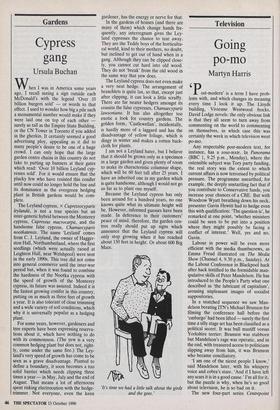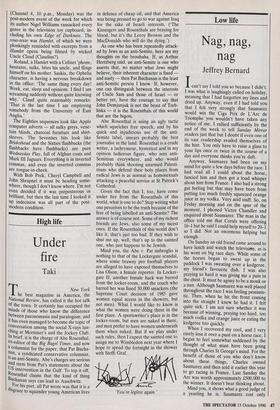Television
Going po-mo
Martyn Harris
Post-modern' is a term I have prob- lems with, and which changes its meaning every time I look it up. The Lloyds building, Vivienne Westwood frocks, David Lodge novels: the only obvious link is that they all seem to turn away from commenting on the world to commenting on themselves, in which case this was certainly the week in which television went po-mo.
Any respectable post-modern text, for instance, has a sous-texte. In Panorama (BBC 1, 9.25 p.m., Monday), where the ostensible subject was Tory party funding, the real story was the extent to which current affairs is now terrorised by political pressure. The programme unearthed, for example, the deeply unstartling fact that if you contribute to Conservative funds, you increase your chances of a CBE. But with Woodrow Wyatt breathing down his neck, presenter Gavin Hewitt had to hedge even this with qualification: 'The question is', he remarked at one point, 'whether ministers could be seen to be put into a position where they might possibly be facing a conflict of interest.' Well, yes and no, Gavin.
Labour in power will be even more efficient with the media thumbscrews, as Emma Freud illustrated on The Media Show (Channel 4, 9.30 p.m., Sunday). At the Labour Conference in Blackpool hack after hack testified to the formidable man- ipulative skills of Peter Mandelson. He has introduced to the People's Party what one described as 'the lubricant of capitalism', arousing unpleasant images of socialist suppositories.
In a snatched sequence we saw Man- delson berating ITN's Michael Brunson for filming the conference hall before the 'embargo' had been lifted — surely the first time a silly stage set has been classified as a political secret. It was bull mastiff versus Yorkshire terrier: Brunson was stubborn but Mandelson's rage was operatic, and in the end, with treasured access to politicians slipping away from him, it was Brunson who became conciliatory.
'I am one of the nicest people I know,' said Mandelson later, with his whispery voice and cobra's stare. 'And if I have left any scars it is in a good cause.' I'm all for it, but the puzzle is why, when he's so good about television, he is so bad on it.
The new four-part series Centrepoint (Channel 4, 10 p.m., Monday) was the post-modern event of the week for which its author Nigel Williams ransacked every genre in the television toy cupboard, in- cluding his own Edge of Darkness. The sous-texte was Hamlet, of which we were plonkingly reminded with excerpts from a Hamlet opera being filmed by wicked Uncle Claud (Claudius?).
Roland, a Hamlet with a Cellnet 'phone, hesitates, sulks, bites his uncle, and flings himself on his mother. Saskia, the Ophelia character, is having a nervous breakdown in the office: 'The same thing every day! Work, eat, sleep and opinions. I find I am screaming suddenly without quite knowing why.' Claud quite reasonably remarks: 'That is the last time I am employing somebody from the University of East Anglia.'
The Eighties sequences look like Apple computer adverts — all sulky greys, vene- tian blinds, charcoal furniture and shirt- sleeves. The Seventies bits look like Brideshead and the Sixties flashbacks (the flashbacks have flashbacks) are pure Wednesday Play, full of Afghan coats and Mark III Jaguars. Everything is in inverted commas, and even the inverted commas are tongue-in-cheek. With Bob Peck, Cheryl Campbell and John Shrapnel it must be heading some- where, though I don't know where. I'm not even decided if it was preposterous or brilliant, but then the last time I looked it up indecision was all part of the post- modern condition:



























































 Previous page
Previous page